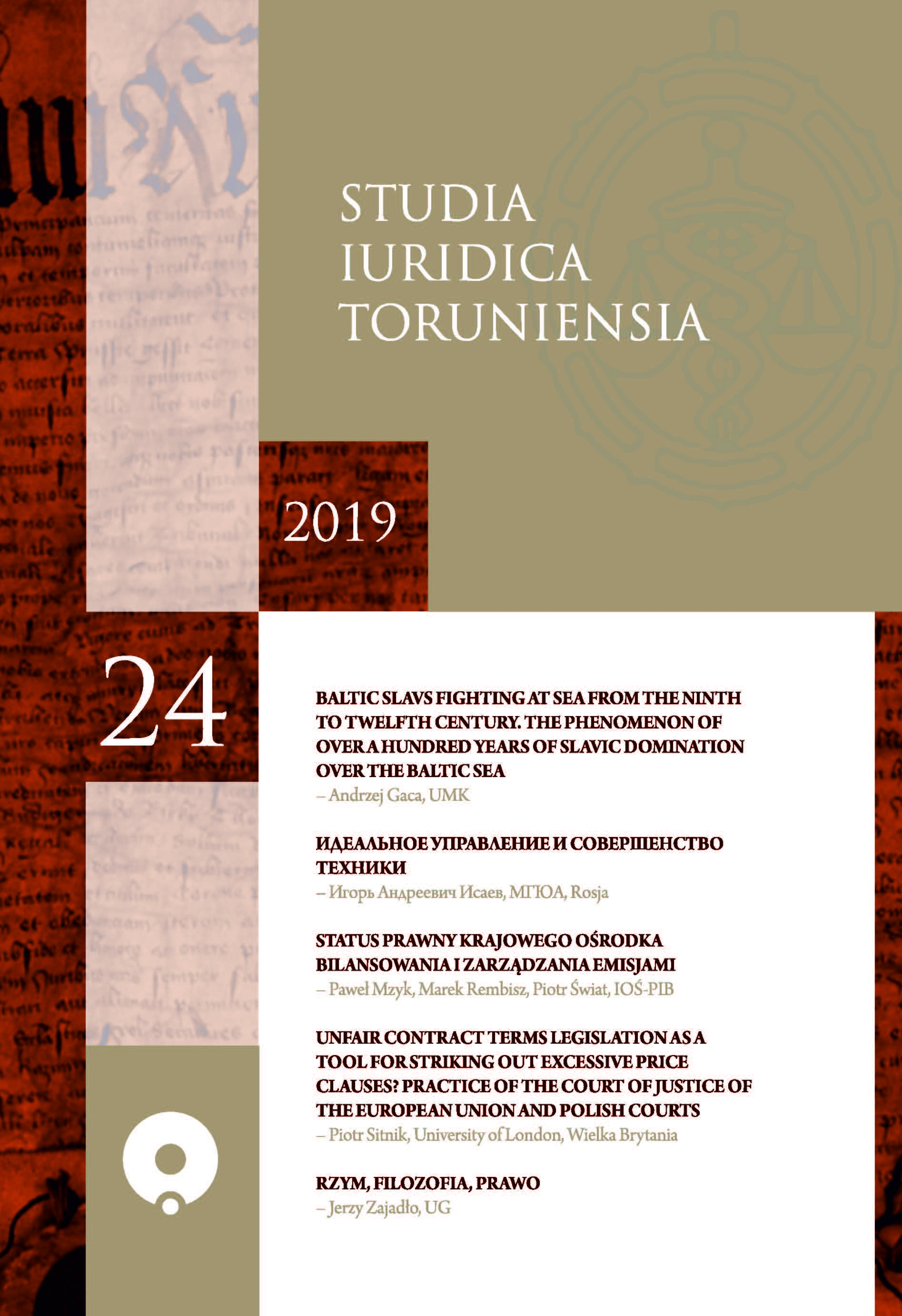Rome, philosophy, law
DOI:
https://doi.org/10.12775/SIT.2019.0013Keywords
Greek philosophy, Roman law, influences, relations, CiceroAbstract
The main purpose of this article is the answer to the following question: what was the relation between Greek philosophy and Roman law? On this background, the author puts the next question: was Cicero the jurist or not? This problem was controversial for many years between romanists, historians and theoreticians of rhetoric as well. The author puts two hypothesis – firstly, the historical one and secondly, the modern one. In the light of the first Cicero was not the jurist, because he played in the court the role of Roman advocatus and not the Roman iuris consultus. From the modern perspective is the problem more complicated – he was the jursit in modern sense, even if he was not the lawyer in today’s meaning.
References
Algra K., Barnes J., Mansfeld J., Schofield M. (ed.), The Cambridge History of Hellenistic Philosophy, Cambridge 1999.
Berlin I., Jeż i lis, tłum. A. Komarek, H. Krzeczkowski, K. Tarnowska, Warszawa 1993.
Burczak K., Dembiński A., Jońca M., Łacińskie sentencje i powiedzenia prawnicze, Warszawa 2018.
Cotterrell R., The Role of the Jurist: Reflections around Radbruch, “Ratio Juris” 2013, vol. 26, issue 4.
Crook J.A., Legal Advocacy in the Roman World, Ithaca–New York 1995.
Cyceron, Mowy, tłum. S. Kołodziejczyk, Z. Mrukowna, D. Turkowska, Kęty 2003.
Gai Institutiones or Institutes of Romas Law by Gaius, transl. and commentary E. Poste, historical introduction A.H.J. Greenidge, Oxford 1904.
Gaius, Instytucje, przeł. C. Kunderewicz, Warszawa 1982.
Gordley J., The Jurists. A Critical History, Oxford 2013.
G riffin M.T., Latin philosophy and Roman law, w: Politeia in Greek and Roman Philosophy, V. Harte, M. Lane (ed.), Cambridge 2013.
Waśkiewicz H., „De legibus” Cicerona – pierwszy w dziejach myśli europejskiej system filozoficzno-prawny, „Roczniki Filozoficzne” KUL 1960, t. 8, nr 2.
Harries J., Cicero and the Jurists. From Citizens’ Law to the Lawful State, London 2006.
Harries J., The law in Cicero’s writings, w: The Cambridge Companion to Cicero, C. Steel (ed.), Cambridge 2013.
Honore T., Ulpian. Pioneer of Human Rights, Oxford 2002.
Honsell H., Mayer-Maly Th., Rechtswissenschaft. Eine Einführung in das Recht und seine Grundlagen, Berlin–Heidelberg 2015.
Kamiński J., Cicero, w: Prawo rzymskie. Słownik encyklopedyczny, red. W. Wołodkiewicz, Warszawa 1986.
Keeline T.J., The Reception of Cicero in the Early Roman Empire. The Rhetorical Schoolroom and the Creation of a Cultural Legend, Cambridge 2018.
Koschenbahr-Łyskowski J., Ratio naturalis w prawie rzymskiem klasycznem, Warszawa 1930.
Kroger J.R., The Philosophical Foundations of Roman Law: Aristotle, the Stoics, and Roman Theories of Natural Law, “Wisconsin Law Review” 2004.
Kubiak P., Kilka uwag na temat znajomości prawa u mówców sądowych republikańskiego Rzymu, „Krakowskie Studia z Historii Państwa i Prawa” 2015, t. 8, nr 1.
Kumaniecki K., Literatura rzymska. Okres cyceroński, Warszawa 1977.
Litewski W., Jurysprudencja rzymska, Krakow 2000.
Litewski W., Podstawowe wartości prawa rzymskiego, Krakow 2001.
Llano Alonso F.H., Cicero and Natural Law, “Archiv fur Rechts- und Sozialphilosophie” 2012, vol. 98, no. 2.
Lučić Z., Cicero als Jurist und Theoretiker, “Annales FLB – Belgrad Law Review” 2010, year LVIII, no. 3.
Michalunio SJ Cz., Dicta editio maior. Zbiór łacińskich sentencji, przysłów, zwrotów, powiedzeń, Kraków 2008.
Muller G.M., Zini F.M. (Hrsg.), Philosophie in Rom – Römische Philosophie? Kultur-, literatur- und philosophiegeschichtliche Perspektiven, Berlin–Boston
Norr D., Cicero-Zitate bei den klassischen Juristen. Zur Bedeutung literarischer Zitate bei den Juristen und zur Wirkungsgechichte Ciceros, Ciceroniana. Atti del III Colloquium Tullianum, Roma 1978.
Notari T., On the Role of Ethical Maxims in the System of Classical Interpretation of Law, w: Is A Universal Morality Possible?, F. Horcher, B. Mester, Z. Turgonyi (ed.), Budapest 2015.
Pikuła Ł., Iurisprudentia, w: Leksykon tradycji rzymskiego prawa prywatnego, red. A. Debiński, M. Jońca, Warszawa 2016.
Plessis P.J. du (ed.), Cicero’s Law. Rethinking Roman Law of the Late Republic, Edinburgh 2016.
Powell J.G.E. (ed.), Cicero: The Philosopher. Twelve Papers, New York 1995 (reprinted 2002).
Riggsby M., Roman Law and the Legal World of the Romans, New York 2010.
Stelmach J., Brożek B., Metody prawnicze. Logika – analiza – argumentacja – hermeneutyka, Warszawa 2006.
Tarwacka A., O sprawiedliwości i prawie. 1 tytuł 1 księgi Digestów. Tekst – tłumaczenie – komentarz, „Zeszyty Prawnicze UKSW” 2003, t. 3, nr 2.
Taylor H., Taylor Hunt M.L., The Sayings of Cicero, w: H. Taylor, Cicero. A Sketch of His Life and Works, Chicago 1916.
Tellegen-Couperus O., Cicero and Ulpian, Two Paragons of Legal Practice, “Revue Internationale des Droits de l’Antiquite” 2008, t. LV.
Vander Waerdt P.A., Philosophical Influence on Roman Jurisprudence? The Case of Stoicism and Natural Law, w: Aufstieg und Niedergang der römischen Welt, Teil II, Band 36, Teilband 6, Walter De Gruyter, Berlin–New York 1992.
Stroh W., Cicero. Redner, Staatsmann, Philosoph, Munchen 2008.
Wibier M.H., Transmitting Legal Knowledge: From Question-and-Answer Format to Handbook in Gaius’ Institutes, w: Between Orality and Literacy: Communication and Adaptation in Antiquity, R. Scodel (ed.), Leiden 2014.
Wołodkiewicz W. (red.), Regulae iuris. Łacińskie inskrypcje na kolumnach Sądu Najwyższego Rzeczypospolitej Polskiej, Warszawa 2010.
Woolf R., Cicero. The Philosophy of a Roman Sceptic, London–New York 2015.
Zajadło J., Czesław Znamierowski – uczony transcendentny, „Państwo i Prawo” 2018, nr 11.
Zajadło J., Czy Cyceron był prawnikiem?, „Palestra” 2018, nr 11.
Zajadło J., Dziedzictwo przeszłości. Gustaw Radbruch: portret filozofa, prawnika, polityka i humanisty, Gdańsk 2007.
Zieliński T., Cicero im Wandel der Jahrhunderte, Wiesbaden 1912.
Zyl D.H. van, Cicero’s Eclecticism and Orgiinality, “Akroterion – Journal for the Classics in South Africa” 1990, vol. 35, vo. 3–4.
Downloads
Published
How to Cite
Issue
Section
Stats
Number of views and downloads: 1872
Number of citations: 0



